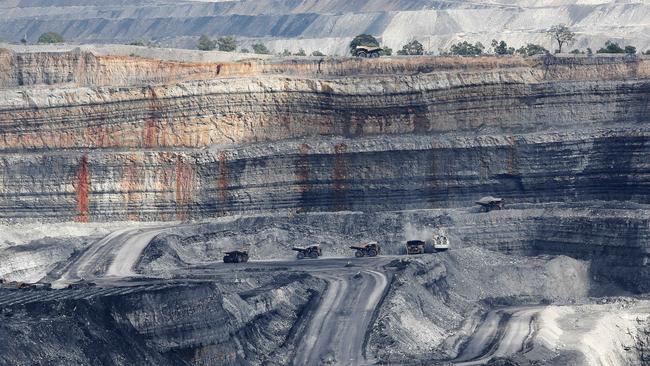Activist hedge fund outlines Glencore coal split plan
The proposal from an activist European fund manager would spin off the company’s coal assets but leave control in the hands of the commodities conglomerate.

Glencore should spin off its Australian coal mines into a special holding company that gives the commodities conglomerate control of – but only a minor economic interest in – the business, says activist European hedge fund Bluebell Capital Partners.
In a letter to Glencore chief executive Gary Nagle, sent in late January but made public overnight, Bluebell chief investment officer Giussepe Bivona outlines a proposal to spin off the company’s coal assets but leave control in the hands of the resources giant.
The plan would create a Coal NewCo with two classes of shares, with Glencore owning one class which gave it control over the board but only 9.09 per cent of the economic interest in the new company. The other class would be distributed among shareholders.
“By decoupling governance and economic rights, Glencore would be able to continue to exercise responsible stewardship, whilst separating coal in the interest of its shareholders,” Mr Bivona wrote in a letter with Bluebell partner Marco Taricco.
“Glencore’s existing (and new) shareholders could then independently decide whether to retain their existing economic exposure (coal and ex-coal assets), or trade the two stocks separately.”
In an interview in December, Mr Bivona said Glencore management had given a false impression of the company’s environmental commitment and said carving off its coal business could life the share price by 45 per cent. However, Bluebell had not at that time outlined how they proposed Glencore separate the two businesses.
Glencore is one of Australia’s largest exporters of coal, and operates 17 mines across NSW and Queensland. The company says the mines employ 9900 workers.
Its Viterra grains subsidiary, which Bluebell had also advocated be sold off, became one of the largest local agricultural business – operating in South Australia and Victoria – after acquiring the ASX-listed ABB Grain in 2009.
On Monday, Mr Bivona told The Australian said the new proposal would result in a “clearly separated” coal business. “But Glencore (would) continue to manage the business because they have full control, they appoint the board, they can transition their ESG strategy to NewCo, I would say, even more responsibly,” he said.
“The whole argument that it’ll end up in someone else’s hand doesn’t fly any more. We essentially say ‘you have a material stake, you know, 10 per cent, you’re still the single largest shareholder in the coal business, you appoint the CEO’.
“We are suggesting a construct where many investors who today can’t have exposure will be able to have … We as a shareholder, we certainly discuss with existing shareholders, but also with investors who are not shareholders, because quite frankly this is what matters to us most. These are the ones who will drive their share price higher.”
In their letter, the Bluebell partners write that there is a “fundamental view that Glencore, because of its exposure to coal, is a ‘disliked stock’ by many investors”.
“And the reality is that the same investors who do not buy Glencore because of coal, are the same investors who would hold Glencore ex-coal as one of their favourite stocks, due to the company’s leading position in metals (like copper, zinc, nickel and cobalt) supporting the green economy transition and decarbonization,” the letter reads.
“Glencore ex-coal should be a top pick in any ESG fund focusing on decarbonization.
“We believe you should consider coal separation an opportunity to encourage Norges Bank to remove Glencore from its exclusion list, and provide a catalyst for the repositioning of Glencore’s equity story as a key player in industry electrification and digitization.”
Several major financiers have begun dropping companies that operate in thermal coal, including the Norwegian sovereign wealth fund, one of the world’s biggest, which in 2020 said it would sell its stake in Glencore. It warned it may do the same for its holding in BHP.
Bluebell, a small investor in Glencore with total funds under management of about €200m ($323m), has had significant success in forcing change at some of Europe’s largest companies.
Danone, a French food products conglomerate, replaced its chief executive and chairman earlier this year after a campaign from Bluebell and another hedge fund, Artisan Partners, which had accused the company of failing to “strike the right balance between shareholder value creation and sustainability”.
Bluebell in May began agitating against plans by French media group Vivendi to dump its biggest asset, Universal Music, by distributing 60 per cent of its capital to shareholders including its largest investor, billionaire Vincent Bollore. The hedge fund has previously – unsuccessfully – pushed for changes at GlaxoSmithKline and Belgian company Solvay.
About 21 per cent of Glencore’s earnings were from coal, recent disclosures show.
In a letter responding to Bluebell, also made public overnight, Glencore’s head of investor relations Martin Fewing said Glencore’s climate strategy allows additional coal volumes to be brought on to replace declining production provided it remained below its targets.
“Specifically, our existing coal production base declined significantly over the next 13 years. The additional projects referenced in your letter offset part of this decline, while the overall portfolio remains in compliance with our Paris-aligned reduction targets,” Mr Fewing wrote in response to claims from Bluebell that coal production plans were “going in exactly the opposite direction” to the company’s decarbonisation targets.
Glencore, in December, said it “engages regularly with its investors”.
“We are confident that our business model is uniquely placed to produce, recycle and market the materials needed to decarbonise energy while reducing our own emissions and delivering value for stakeholders,” the company said at the time.


